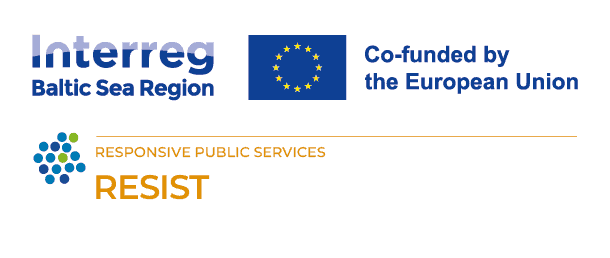Social Innovation Project Exchange Part II - Financing
Project: RESIST
Virtual Meeting
22. January 2026
10:00 - 11:30 (CET)

Social Innovation and Social Entrepreneurship have the potential to offer new and creative solutions for current societal challenges such as climate change, inequality, economic instability and technological disruptions. Yet, the structural support to build strong social innovation ecosystems is lacking in many regions in the Baltic Sea Region.
While social innovators and social entrepreneurs provide crucial solutions for transformative challenges, mainstream innovation strategies and support systems largely neglect social innovation. For instance, financing options are often not fitting the needs of social innovation actors – short-term project grants dominate, and many funders still favour measurable, quantifiable outcomes. In addition, social innovation actors lack capacity-building and organisational support, and policy and regulations need to be adjusted.
Rather than investing resources into new, additional and parallel support systems for social innovation, RESIST strives to open existing support for innovation, business and financing schemes, and make the structures more accessible for social innovators and social entrepreneurs. This requires challenging policies, perceptions and business models that are currently mainly growth and profit oriented and introducing innovation paradigms as well as measurement of societal impact of innovation to the regional ecosystems, support actors and mainstream businesses.
The RESIST team develops a model of a Cluster of Social and Ecological Innovation (CSEI) for the Baltic Sea Region, accompanied by a Mission-Oriented Innovation Policy Guide. This prototypical set-up aids regional authorities in setting up cluster organisations that are key enablers for thriving social innovation ecosystems.
Complementary to the Cluster model and building on existing innovation support structures, the RESIST team builds a capacity growing approach, targeting existing innovation and business support actors and enabling them to make their existing support programmes, education and financing schemes fit for the needs of social innovators.
The Cluster model and the capacity building approach together enable regional authorities, business support organisations and sectoral agencies to build strong structures that create and strengthen thriving ecosystems for social innovation and social entrepreneurship.
Five pilot regions – Pomorskie (Poland), Võru (Estonia), Västerbotten (Sweden), Kurzeme (Latvia), Hamburg (Germany) are testing solution one – the prototypical cluster – and either build from scratch or further develop cluster organisations.
In addition, seven piloting partners – the above regions plus Agder (Norway) and the Lithuanian Innovation Centre – pilot the capacity building approach for innovation support actors and business support actors.
Early results show that the innovation support actors are very interested in the capacity building offers that RESIST partners provide. In Võru and Hamburg for instance, participants who took part in the first train-the-trainers returned for the second training or joined other events offered by the RESIST project.
While setting up a completely new cluster organisation is an immense and very time-consuming challenge, the prototypical cluster provides an important point of departure for building momentum to kick-start the process of building a cluster organisation and help structure the stakeholder process around it.
With the Interreg Baltic Sea Region support, RESIST empowers regional authorities to take the lead in creating strong and lasting structures that allow social innovation ecosystems to thrive. The long-term vision is to raise the number of CSEIs in the Baltic Sea Region and to facilitate cooperation between them. Through RESIST, regional authorities will deeply root social innovation in their rationale on innovation support and integrate social innovation in their respective regional innovation strategies.
Project: RESIST
Virtual Meeting
22. January 2026
10:00 - 11:30 (CET)
Project: RESIST
Virtual Meeting
24. November 2025
10:00 - 11:30 (CET)
Project: RESIST
Physical Meeting
29. - 30. October 2025
Project: RESIST
Physical Meeting
28. October 2025
Project: RESIST
Virtual Meeting
01. October 2025
Project: RESIST
Physical Meeting
30. September 2025 - 01. October 2025
Project: RESIST
Physical Meeting
30. September 2025
Project: RESIST
Virtual Meeting
17. September 2025
10:00 - 11:30 (CET)
Project: RESIST
Virtual Meeting
28. August 2025
Project: RESIST
Virtual Meeting
17. April 2025
10:00 - 11:30 (CET)
Project: RESIST
Physical Meeting
08. - 09. April 2025
Project: RESIST
Virtual Meeting
03. April 2025
10:00 - 11:00 (CET)
Project: RESIST
Virtual Meeting
19. March 2025
03:30 - 04:30 (CET)
Project: RESIST
Virtual Meeting
06. March 2025
10:00 - 11:00 (CET)
Project: RESIST
Virtual Meeting
09. December 2024
10:00 - 11:30 (CET)
Project: RESIST
Physical Meeting
05. December 2024
00:00 - 23:59 (BST)
Project: RESIST
Virtual Meeting
04. November 2024
10:00 - 11:30 (CET)
Project: RESIST
Physical Meeting
30. - 31. October 2024
Project: RESIST
Virtual Meeting
17. - 18. September 2024
09:00 - 20:00 (CET)
Project: RESIST
Virtual Meeting
26. June 2024
14:00 - 15:00 (CEST)
Project: RESIST
Physical Meeting
04. - 05. June 2024
09:00 - 18:00 (CEST)
Project: RESIST
Virtual Meeting
23. May 2024
09:00 - 11:00 (CEST)
Project: RESIST
Physical Meeting
11. - 13. December 2023